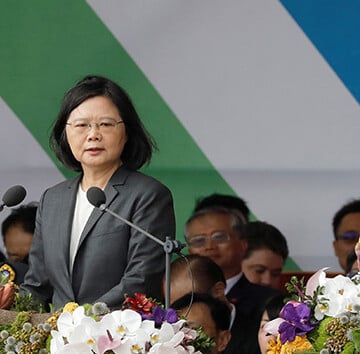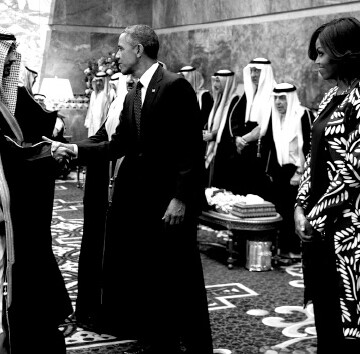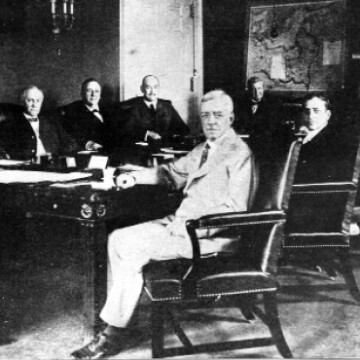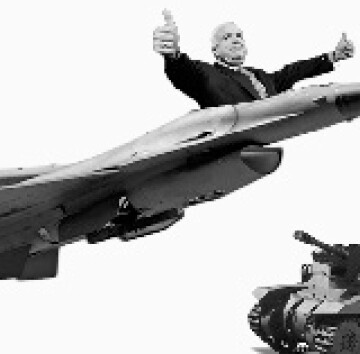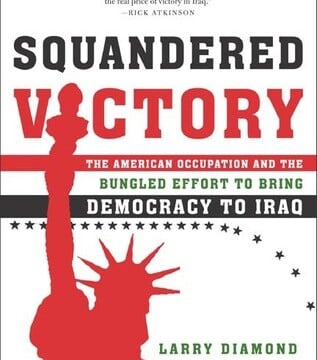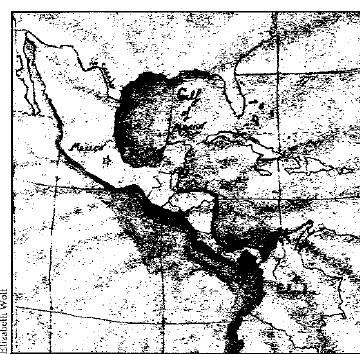In the aftermath of the U.S.-led air and missile strikes on Syria for the April incident in which Bashar al-Assad’s government allegedly used chemical weapons against innocent civilians, calls are growing for the Trump administration to deepen U.S. military involvement for the explicit purpose of ousting Assad. Those pundits and politicians who advocate a regime-change...
Author: Ted Galen Carpenter (Ted Galen Carpenter)
Taiwan, China, and Unnecessary War
While America’s attention remains focused on the North Korea crisis, another dangerous East Asia confrontation has re-emerged. The People’s Republic of China (PRC) is taking new steps to intimidate Taiwan and force the island’s leaders to move toward political reunification with the mainland. The latest measures aim to make it clear to Taiwanese officials and...
Killing Due Process in the War on Terror
From the October 2013 issue of Chronicles. One striking feature of the U.S. Constitution is the number of procedural rights guaranteed to individuals accused of criminal behavior before they can be deprived of life, liberty, or property. The overall guarantee of due process of law contained in the Fifth and Fourteenth Amendments constitutes the basic...
The Saudi-Iranian Blood Feud
Tensions between Saudi Arabia and Iran, which have frequently flared over the years, reached full intensity this winter when the Saudi government executed 47 regime opponents, including the prominent Shi’ite cleric Nimr al-Nimr. Immediately, there were riots in Iran directed against Saudi targets, culminating in the burning of the Saudi embassy—an incident that even Iran’s...
North Korea: A New Perspective
Reports that North Korea tested a hydrogen bomb in early January caused consternation bordering on panic in both Washington and the East Asian capitals. That reaction appears to have been a bit excessive. The available evidence indicates that the explosion was far too small to be a thermonuclear device. Most likely, it was the test...
Washington’s Foreign Policy Folly
A basic requirement of a wise and effective foreign policy is the ability to establish priorities and make tough choices. Unfortunately, U.S. officials seem increasingly incapable of accomplishing such a task. That grim reality is all too evident as the Obama administration drifts into confrontational relationships simultaneously with Russia and China. Even Henry Kissinger, hardly...
Intransigent Diplomacy
There is a disturbing pattern over the decades in Washington’s negotiations with countries deemed to be adversaries. It is a tendency to adopt a rigid stance marked by unrealistic demands that make achieving a settlement virtually impossible. Often, harsh economic sanctions against the target country reinforce the provocative diplomatic posture. Most recently, that conduct has...
Endorsing Demise
There is a distressing history of foreign insurgent groups manipulating U.S. political figures, policymakers, and opinion leaders into supporting their causes. Frequently, that support goes far beyond rhetorical endorsements. On several occasions during the late 20th and early 21st centuries, foreign lobbying efforts have led to U.S. military and financial aid being given to highly...
Trading Liberty for Security
Attacks on constitutional liberties, including the erosion of due-process protections for the rights to life, liberty, and property, tend to soar in wartime. The most egregious assaults have occurred during the Civil War, the two world wars, and, most recently, in the so-called War on Terror. Courageous individuals spoke out against the abuses during and...
Killing Due Process in the War on Terror
One striking feature of the U.S. Constitution is the number of procedural rights guaranteed to individuals accused of criminal behavior before they can be deprived of life, liberty, or property. The overall guarantee of due process of law contained in the Fifth and Fourteenth Amendments constitutes the basic foundation, but there are many other protections. ...
Our Dangerous Foreign-Policy Freeloaders
During the late winter and early spring of 2013, yet another crisis involving North Korea occupied the attention of U.S. officials and much of the news media. Not only did Pyongyang conduct a nuclear test, but the government of Kim Jong-un issued shrill threats against both South Korea and the United States. South Korea’s new...
Syria’s Jihadist Rebels
Although Sen. Lindsey Graham (R-SC) and other hawks have urged the United States to put “boots on the ground in Syria,” the Obama administration thus far seems determined to resist such calls. Indeed, the White House has rejected lobbying efforts even to establish a no-fly zone to impede Syrian dictator Bashar al-Assad’s military campaign against...
Failure to Launch
North Korea’s failed missile launch has created a pervasive sense of relief and a little smirking in U.S. and East Asian policy circles. The latest episode was Pyongyang’s fourth unsuccessful launch of a satellite since 1998, and it confirmed that the country’s missile program still faces some daunting challenges. Even though the North Korean regime...
Conservatives Leninists and the War on Terror
One long-standing hallmark of Western conservative thought is the emphasis on the rule of law. Earlier generations of conservatives understood that, without such constraints, liberty would be imperiled and a free society would ultimately descend into tyranny. As Lord Acton observed, “Power tends to corrupt, and absolute power corrupts absolutely.” Even during the 20th century,...
Needed: A North Korean “Plan B”
For years, the United States and East Asian nations have proceeded on the assumption that a diplomatic solution to the North Korean nuclear crisis is feasible. A settlement would entail Pyongyang’s renunciation of its nuclear ambitions in exchange for diplomatic and economic concessions by the other participants in the six-party talks. But what if the...
China Ups the Ante
Despite professions of friendship and cooperation in Washington and Beijing, U.S.-Chinese relations in the Obama era are off to a rocky start. The most prominent cause of tension was an incident in early March in the South China Sea. U.S.S. Impeccable, a “survey vessel” (spy ship) was conducting operations some 30 miles off the coast...
NATO at 60: A Hollow Shell
When NATO marks its 60th birthday on April 4, there will be much celebration. Proponents will hail not only the alliance’s longevity and past successes but its goals in the coming decades. Their optimism is based, in part, on statements by the new government in NATO’s leading power, the United States. While the administration of...
Obama on Foreign Policy: A Mysterious Work in Progress
The central theme of Sen. Barack Obama’s campaign for the presidency has been his call for “change”—albeit often with few details about the nature of that change. There is certainly a pressing need for change in U.S. foreign policy. During the Cold War, Washington’s strategy led to security free-riding by allies and clients, caused the...
John McCain on Foreign Policy: Even Worse Than Bush
Over the years, John McCain has acquired a reputation as a maverick Republican. Independents and even some Democrats who loathe George W. Bush’s foreign-policy record seem to believe that McCain would be a significant improvement. In several GOP primaries earlier this year, most notably those in New Hampshire and Michigan, nearly one third of voters...
John McCain on Foreign Policy
Over the years, John McCain has acquired a reputation as a maverick Republican. Independents and even some Democrats who loathe George W. Bush’s foreign-policy record seem to believe that McCain would be a significant improvement. In several GOP primaries earlier this year, most notably those in New Hampshire and Michigan, nearly one third of voters...
The Surge “Success”
In recent months, supporters of the mission in Iraq have been in high spirits. They insist that the “Surge”—the strategy of deploying an additional 30,000 U.S. troops, which President Bush announced in December 2007—has turned around the dire security situation. The Bush administration, they believe, has finally adopted the right approach to Iraq. War proponents...
The End of the Balkan Interlude?
Unlike the 1990’s, when the turmoil from the breakup of Yugoslavia dominated the security agenda of the United States and her NATO allies, subsequent years have been relatively quiet. The civil war in Bosnia has not flared up since the conclusion of the Dayton Accords in late 1995. Albania, which teetered on the brink of...
Out of Iraq, Into Darfur?
In the fourth Democratic presidential debate (July 23), the candidates were united on the need for the United States to withdraw from Iraq. But most of them (with the notable exception of Bill Richardson) were equally convinced of the need to intervene in Darfur. Sen. Joe Biden was out front on that issue, arguing that...
Tethering the Hegemon
When examining American or European views on the use of force and the role of international institutions, it is necessary to speak only of general tendencies. There are, of course, many exceptions to the overall trend on both sides of the Atlantic. Nevertheless, generally speaking, America’s longtime European allies have become increasingly alarmed at aspects...
Modern Chinese Secret?
Beijing announced in early March that it plans to boost China’s defense budget by 17.8 percent in the coming year. That fairly hefty increase continues a pattern of double-digit hikes over the past decade. Both the United States and China’s neighbors in East Asia are expressing growing uneasiness about the trend. Far more troubling, however,...
Modern Chinese Secret
Beijing announced in early March that it plans to boost China’s defense budget by 17.8 percent in the coming year. That fairly hefty increase continues a pattern of double-digit hikes over the past decade. Both the United States and China’s neighbors in East Asia are expressing growing uneasiness about the trend. Far more troubling, however,...
A Strategy to Quarantine the Violence in Iraq
President Bush’s decision to send 21,500 additional troops to Iraq is a desperate attempt to salvage a mission that has gone terribly wrong. Instead of persisting in a strategy that will have U.S. forces trying to referee a multisided civil war, Washington should focus on a more achievable objective: working with Iraq’s neighbors to quarantine...
Reject False Prophets
In marked contrast to the optimism that the Bush administration and its supporters expressed about developments in Iraq as late as the spring of 2006, only a few diehards now deny that the security environment there is dire. When Sen. Carl Levin (D-MI) asked secretary of defense nominee Robert Gates whether the United States was...
North Korea Joins the Club
North Korea has now barged into the global nuclear-weapons club by conducting a nuclear test. The six-party talks designed to get Pyongyang to relinquish its ambitions for a nuclear arsenal have effectively failed. Even if North Korea can be induced to return to those talks (which Pyongyang has boycotted for a year), the prospect that...
North Korea and Iran
The United States faces twin crises involving nuclear proliferation, as both North Korea and Iran seem poised to barge into the global nuclear-weapons club. (There are indications that North Korea may have already done so, since she has processed enough plutonium to build as many as 13 weapons.) U.S. policy toward those two rogue states...
America’s Other War
Americans are understandably concerned about the grave security situation in Iraq. The United States has suffered more than 2,500 fatalities in that conflict and has yet to defeat the insurgency. Indeed, the level of violence in Iraq is increasing, and much of that violence now consists of sectarian bloodshed between Sunnis and Shiites. The American...
Collision Course
While the United States is preoccupied with Iraq, Iran, and North Korea, a far more dangerous crisis is brewing: the prospect of an armed confrontation between Taiwan and mainland China. Unfortunately, Washington’s current policy places us in the middle of that quarrel. If U.S. leaders do not change course, America could find herself in a...
China and the North Korean Nuclear Crisis
Since the North Korean nuclear crisis began in October 2002, Washington has believed that China is the key to solving the problem. The Bush administration has indicated repeatedly that it expects the PRC to exert whatever diplomatic and economic pressure is needed to get North Korea to abandon her nuclear ambitions. From time to time,...
Learning At the Periphery
“Soldiers are the only hope against democrats.” —Wilhelm von Merckel The Bush administration’s crusade to overthrow Iraqi dictator Saddam Hussein and build Iraq into a democratic model for the Middle East has become a highly controversial and divisive undertaking. Larry Diamond was not a supporter of the war in Iraq, but when his old friend...
Is Mexico the Next Colombia?
Despite recent improvements in the overall security situation in Colombia, the Bush administration remains worried about that country. Washington’s nightmare scenario is the emergence of a narcotrafficking state allied with extremist political elements and terrorist organizations. U.S. leaders are sufficiently concerned about that possibility that they are ready to continue America’s extensive antinarcotics aid to...
Transforming the Middle East
It is increasingly clear that the Bush administration’s nation-building policy in Iraq is merely one component of an ambitious project to transform the Middle East politically. That goal is consistent with the principles that President Bush expressed in his Second Inaugural Address, in which he announced that “it is the policy of the United States...
Dealing With a Nuclear Iran
Iran’s agreement to “suspend” her nuclear program in exchange for economic benefits from the European Union has dampened that crisis for the moment. The Bush administration’s vocal skepticism about the agreement, however, suggests that the crisis has not been defused. Moreover, Iran emphasizes that her nuclear activities have only been suspended, not abolished. That is...
January Elections
The Bush administration and its supporters are investing tremendous hope in Iraq’s January national elections. According to the conventional wisdom in Washington, violence may increase as the balloting approaches, but, once the election is held, the overwhelming majority of Iraqis will be convinced that the resulting government is legitimate. Except for the foreign terrorists and...
Out on a Limb: America’s Pledge to Defend Taiwan
Washington’s implicit commitment, under the 1979 Taiwan Relations Act, to defend Taiwan from attack is becoming more perilous by the year. Given Beijing’s increasingly insistent demands that Taiwanese leaders cease their efforts to spurn reunification with the mainland, there is a very real possibility that the United States will someday be called upon to honor...
The Next Foreign-Policy Crisis
Iran is fast emerging on Washington’s radar screen as the next major foreign-policy crisis. Several officials in the Bush administration—including the President himself—emphasized that the United States will never allow Iran to develop nuclear weapons. And, on that issue, there was no significant difference between President Bush and John Kerry. Equally ominous, many of the...
Instinct for the Capillaries: The 9-11 Commission Report
The National Commission on Terrorist Attacks Upon the United States (the 9-11 Commission) released its report to much media fanfare in late July. Although the commissioners labored mightily, they have given birth to a mouse. The report is safe, cautious, and eminently bipartisan. In other words, it largely avoids discussing the most serious issues surrounding...
Instinct for the Capillaries: The 9-11 Commission Report
The National Commission on Terrorist Attacks Upon the United States (the 9-11 Commission) released its report to much media fanfare in late July. Although the commissioners labored mightily, they have given birth to a mouse. The report is safe, cautious, and eminently bipartisan. In other words, it largely avoids discussing the most serious issues surrounding...
Washington’s Imperial Socialism
Critics have castigated the Bush administration’s nation-building venture in Iraq as a manifestation of U.S. imperialism. That is an apt description of the Iraq mission, as well as the ongoing missions in Bosnia and Kosovo. America’s nation-building bureaucrats are not pursuing just any kind of imperialism, however: It is a distinctly left-of-center variety. As the...

